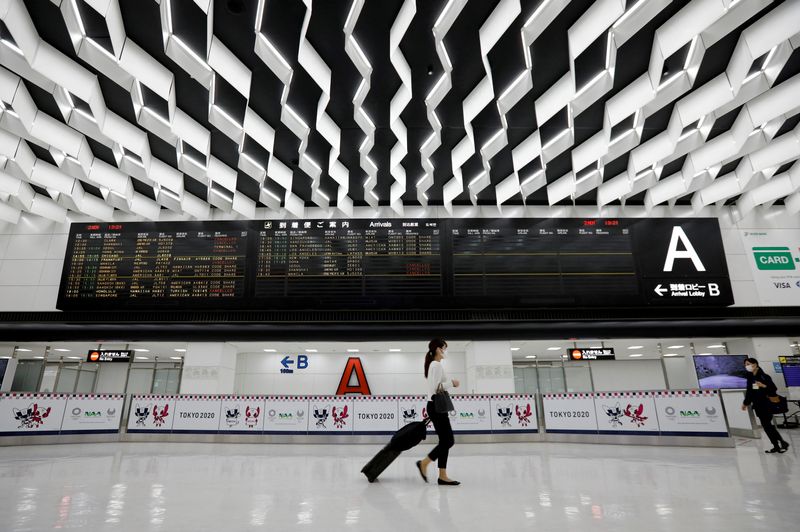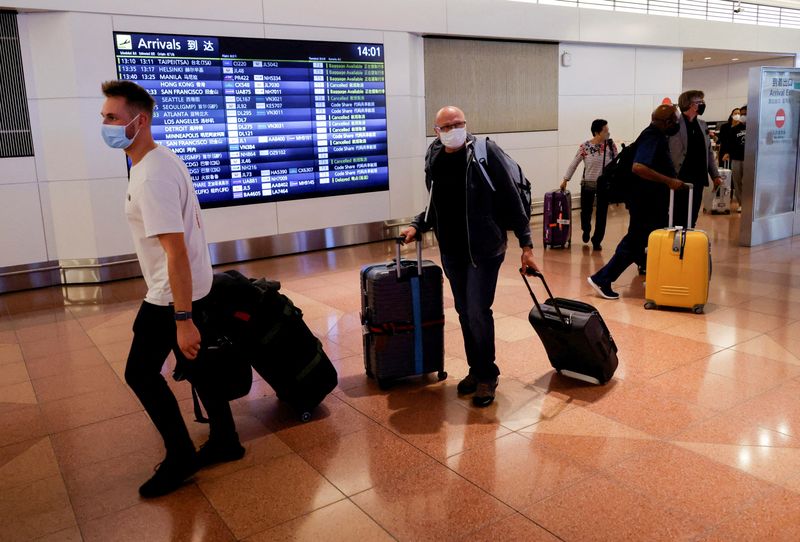By Maki Shiraki and Rocky Swift
TOKYO (Reuters) - Japan is already seeing an increase in inbound travellers since relaxing its COVID-19 border controls last week, but a full recovery will remain elusive until China opens up, said the head of the country's biggest international airport.
Narita Airport chief executive Akihiko Tamura said a jump in overseas arrivals in Japan's biggest international travel hub was an indication of this broader trend.
International arrivals have ticked up about 10 percentage points to about 30% of pre-pandemic levels since Japan reinstated visa-free travel to tourists on Oct. 11, Tamura told Reuters, citing airport research.
"To return to 2019 levels, it's not enough just for Japan to open up," he said. "Of course, China has to change as well or it's impossible."
Chinese visitors made up a sizable portion of Narita's volume until borders started clamping shut in 2020, Tamura said, adding that Beijing's continuation of a zero-COVID policy and Japan's delayed reopening will push back a full recovery in East Asia travel to as late as 2025.
Ahead of the Communist Party Congress this week, China repeatedly emphasised its commitment to its zero-COVID strategy, dashing hopes that Beijing may soon start exiting a policy that has all but shut its borders for travel.
A record 9.5 million Chinese people visited Japan in 2019, about a third of all visitors, according to the national tourism agency.
Japan threw open its doors to foreign visitors last week after more than two years of pandemic isolation and is counting on tourism to help invigorate the economy and reap some benefits from the yen's slide to a 32-year low.
But the reverse effect of the weak yen is that it makes overseas travel more expensive for Japanese people, said Tamura. Pent-up demand may be driving outbound bookings now, but the currency effect may drive domestic consumers to fly on low-cost carriers and stay at cheaper hotels overseas, he said.
PANDEMIC DAMAGE
Nearly half of Narita's 260 shops and restaurants remain shuttered, and it may take several months for many of them to reopen, due mainly to a staffing crunch, Tamura said.
"The last two to three years have been very damaging," he said. "Quite a lot of people have left the airport and aviation industry, and the tourism sector nationwide, so it will take some time for them to return."
Some 70 kilometres from central Tokyo, or about an hour away via high-speed train, Narita Airport has ceded some ground in recent years to Haneda Airport, which lies much closer to the capital.

To boost business, Tamura said Narita needed to shift from being focused on Japanese consumers to offering a store line-up that serves overseas and transit travellers better. Longer-term, the airport may need to pull together its three disparate terminals into one, more convenient hub, he added.
"If the customer can spend a certain amount of time comfortably or happily in an airport, they'll be more inclined to spend money," he said. "So I think this is an area where we must make efforts."
